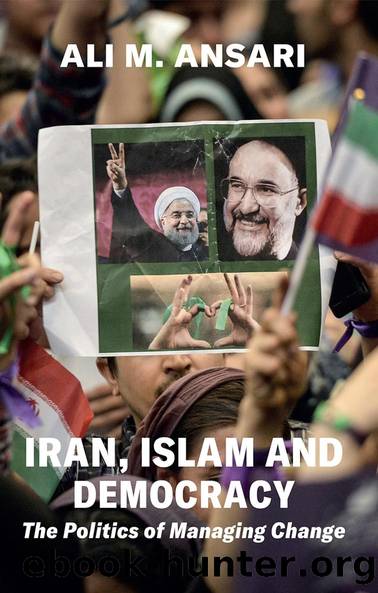Iran, Islam and Democracy by Ali M. Ansari

Author:Ali M. Ansari [Ansari, Ali M.]
Language: eng
Format: epub
Tags: Political Science, Political Ideologies, Democracy, History & Theory, International Relations, General, Social Science, Anthropology, Cultural & Social
ISBN: 9781862031173
Google: epeKAAAAMAAJ
Publisher: Royal Institute of International Affairs
Published: 2000-01-15T22:34:10+00:00
____________________________
1 Aftab-e Yazd, 17 Shahrivar 1381/8 September 2002, pp. 6â7. Habibollah Asgarowladi was leader of the hardline Moutalafeh Group.
2 Mohammad Hashemi, for example, urged conservatives not to seek revenge, while his brother, former President Rafsanjani, urged the new Majlis to take the âlong viewâ: Aftab-e Yazd, 3 Esfand 1382/22 February 2004, p. 11. For an insight into conservative tactical reflections and appreciation of public opinion, see the letter from Ahmad Pour-Nejati and Mohsen Mirdamadi to President Khatami, reproduced by ISNA, 7 Esfand 1382/26 February 2004).
3 This aspiration was pronounced by Haddad-Adel, the new Speaker of the Majlis; see Aftab-e Yazd, 3 Esfand 1382/22 February 2004, pp. 1, 11. One reader hoped that the new Speaker did not intend to raise income tax to the level of Japan (apparently 67 per cent): Aftab-e Yazd, 10 Esfand 1382/29 February 2004, p. 5.
4 âReadersâ Commentsâ, Aftab-e Yazd, 3 Esfand 1382/22 February 2004, p. 11.
5 The Rashidian brothers were merchants in the pay of British intelligence who helped orchestrate the coup against Dr Mosaddeq.
6 See also âReadersâ Commentsâ, Aftab-e Yazd, 20 Bahman 1382/9 February 2004, p. 11. 7 âReadersâ Commentsâ, Aftab-e Yazd, 23 Bahman 1382/12 February 2004, p. 7.
8 Ibid. As if to emphasise a point, one reader commended the US assault on Bin Ladenâs hideout in southern Afghanistan, expressing the hope that the âterroristâ would be caught: Aftab-e Yazd, 5 Esfand 1382/24 February 2004, p. 5.
9 âReadersâ Commentsâ, Aftab-e Yazd, 3 Esfand 1382/22 February 2004, p. 11.
10 âIranian Weekly Shut Down for Insulting Clericsâ, AFP, Tehran, 15 March 2004.
11 As with corruption under the shah, it was not so much the existence of abuse that riled the public as the tendency towards excess.
12 Even his closest advisers admitted this failure to lead: see the interview with M. R. Khatami in Newsweek International, 1 March 2004; A. R. Alavi-Tabar, Yas-e No, 20 Bahman 1382/10 February 2004, p. 2.
13 For Ahmadinejadâs interpretation of âfundamentalistâ see Didgahha-ye Mahmoud Ahmadinejad (3) [Mahmoud Ahmadinejadâs political views (3)], on IRNA website, 4 Tir 1384/26 June 2005. IRNA provided a comprehensive list of Ahmadinejadâs views following his victory in the first round of the presidential election.
14 See above, p. 57.
15 The sense of continuing grievance is well expressed by a war veteranâs complaint in the newspaper Aftab-e Yazd, 20 Bahman 1382/9 February 2004, p. 11, that, having given everything for the war and forsaken the pleasures of this world, he is struck by the fact that those who sent him to fight and to think of the afterlife are now driving expensive cars.
16 The narrative broadly follows that of Dog Day Afternoon.
17 This early âgolden ageâ was central to the reformist interpretation of the revolution. Indeed, both reformists and the neo-conservatives shared the conviction that Rafsanjani had perverted the legacy of the revolution.
18 This is a play on the name of Saeed Eslami, who was convicted of organising the chain murders of 1998. âSaeedâ comes from the Arabic root for happiness.
19 Mohammad Hajizadeh, âyad bad an roozgaran, yad bad!â [Remember those days! Oh, remember!], pp.
Download
This site does not store any files on its server. We only index and link to content provided by other sites. Please contact the content providers to delete copyright contents if any and email us, we'll remove relevant links or contents immediately.
| Bahrain | Egypt |
| Iran | Iraq |
| Israel & Palestine | Jordan |
| Kuwait | Lebanon |
| Oman | Qatar |
| Saudi Arabia | Syria |
| Turkey | United Arab Emirates |
| Yemen |
Empire of the Sikhs by Patwant Singh(23066)
The Wind in My Hair by Masih Alinejad(5084)
Rise and Kill First by Ronen Bergman(4768)
The Templars by Dan Jones(4678)
The Rape of Nanking by Iris Chang(4194)
12 Strong by Doug Stanton(3541)
Blood and Sand by Alex Von Tunzelmann(3186)
Babylon's Ark by Lawrence Anthony(2666)
The History of Jihad: From Muhammad to ISIS by Spencer Robert(2614)
No Room for Small Dreams by Shimon Peres(2356)
The Turkish Psychedelic Explosion by Daniel Spicer(2352)
Inside the Middle East by Avi Melamed(2347)
Gideon's Spies: The Secret History of the Mossad by Gordon Thomas(2330)
Arabs by Eugene Rogan(2291)
The First Muslim The Story of Muhammad by Lesley Hazleton(2257)
Come, Tell Me How You Live by Mallowan Agatha Christie(2244)
Bus on Jaffa Road by Mike Kelly(2146)
1453 by Roger Crowley(2018)
Kabul 1841-42: Battle Story by Edmund Yorke(2014)
